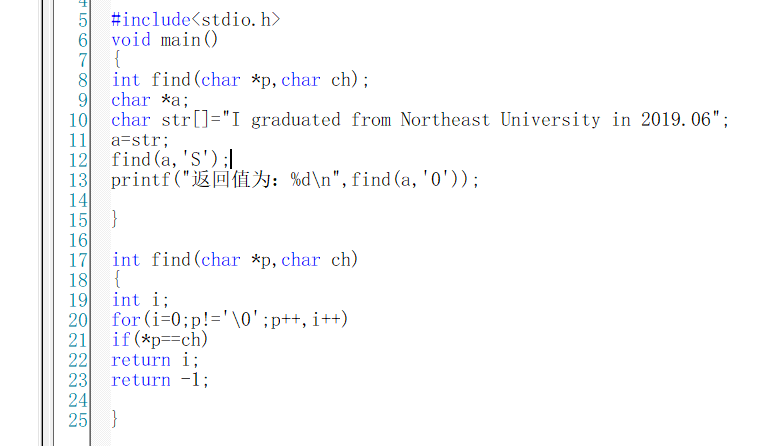70,040
社区成员
 发帖
发帖 与我相关
与我相关 我的任务
我的任务 分享
分享
int find(char *p, char ch)
{
char *tmp = p;
while (tmp) {
if (*tmp == ch)
return tmp - p;
tmp++;
}
return -1;
/*
char *pd=p;
int i=0;
while(*p!='\0'){
if(strncmp(p,&ch,1)==0){
return i;
}
else{
p++;
i++;
}
}
*/
return -1;
}int find(char *p, char ch)
{
char *tmp = p;
while (tmp) {
if (*tmp == ch)
return tmp - p;
tmp++;
}
return -1;
/*
char *pd=p;
int i=0;
while(*p!='\0'){
if(strncmp(p,&ch,1)==0){
return i;
}
else{
p++;
i++;
}
}
*/
return -1;
}int find(char *p, char ch)
{
char *tmp = p;
while (*tmp) { //这个地方要用*tmp,因为用于判断'\0'
if (*tmp == ch)
return tmp - p;
tmp++;
}
return -1;
/*
char *pd=p;
int i=0;
while(*p!='\0'){
if(strncmp(p,&ch,1)==0){
return i;
}
else{
p++;
i++;
}
}
*/
return -1;
}int find(char *p, char ch)
{
char *tmp = p;
while (tmp) {
if (*tmp == ch)
return tmp - p;
tmp++;
}
return -1;
/*
char *pd=p;
int i=0;
while(*p!='\0'){
if(strncmp(p,&ch,1)==0){
return i;
}
else{
p++;
i++;
}
}
*/
return -1;
}int find(char *p, char ch)
{
char *tmp = p;
while (*tmp) { //这个地方要用*tmp,因为用于判断'\0'
if (*tmp == ch)
return tmp - p;
tmp++;
}
return -1;
/*
char *pd=p;
int i=0;
while(*p!='\0'){
if(strncmp(p,&ch,1)==0){
return i;
}
else{
p++;
i++;
}
}
*/
return -1;
}int find(char *p, char ch)
{
char *tmp = p;
while (tmp) {
if (*tmp == ch)
return tmp - p;
tmp++;
}
return -1;
/*
char *pd=p;
int i=0;
while(*p!='\0'){
if(strncmp(p,&ch,1)==0){
return i;
}
else{
p++;
i++;
}
}
*/
return -1;
}int find(char *p, char ch)
{
char *tmp = p;
while (tmp) {
if (*tmp == ch)
return tmp - p;
tmp++;
}
return -1;
/*
char *pd=p;
int i=0;
while(*p!='\0'){
if(strncmp(p,&ch,1)==0){
return i;
}
else{
p++;
i++;
}
}
*/
return -1;
}int find(char *p, char ch)
{
char *tmp = p;
while (*tmp) { //这个地方要用*tmp,因为用于判断'\0'
if (*tmp == ch)
return tmp - p;
tmp++;
}
return -1;
/*
char *pd=p;
int i=0;
while(*p!='\0'){
if(strncmp(p,&ch,1)==0){
return i;
}
else{
p++;
i++;
}
}
*/
return -1;
}int find(char *p, char ch)
{
char *tmp = p;
while (tmp) {
if (*tmp == ch)
return tmp - p;
tmp++;
}
return -1;
/*
char *pd=p;
int i=0;
while(*p!='\0'){
if(strncmp(p,&ch,1)==0){
return i;
}
else{
p++;
i++;
}
}
*/
return -1;
}int find(char *p, char ch)
{
char *tmp = p;
while (*tmp) { //这个地方要用*tmp,因为用于判断'\0'
if (*tmp == ch)
return tmp - p;
tmp++;
}
return -1;
/*
char *pd=p;
int i=0;
while(*p!='\0'){
if(strncmp(p,&ch,1)==0){
return i;
}
else{
p++;
i++;
}
}
*/
return -1;
}int find(char *p, char ch)
{
char *tmp = p;
while (tmp) {
if (*tmp == ch)
return tmp - p;
tmp++;
}
return -1;
/*
char *pd=p;
int i=0;
while(*p!='\0'){
if(strncmp(p,&ch,1)==0){
return i;
}
else{
p++;
i++;
}
}
*/
return -1;
}int find(char *p, char ch)
{
char *tmp = p;
while (*tmp) { //这个地方要用*tmp,因为用于判断'\0'
if (*tmp == ch)
return tmp - p;
tmp++;
}
return -1;
/*
char *pd=p;
int i=0;
while(*p!='\0'){
if(strncmp(p,&ch,1)==0){
return i;
}
else{
p++;
i++;
}
}
*/
return -1;
}